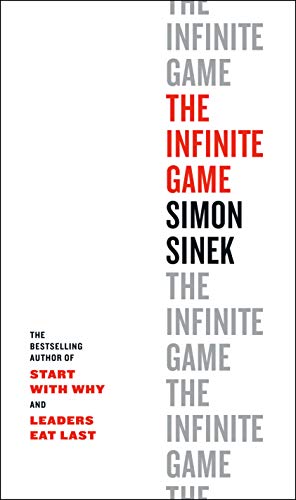The Infinite Game
The JC is indebted to TED-talker extraordinaire Simon Sinek for the TED talk which introduced him to James P. Carse’s obscure but brilliant book Finite and Infinite Games, which provides the basic idea for this, Sinek’s take on the subject.
|
And here let me pause this review, and say you can save yourself the ten minutes it will take to read it and the handful of hours you may waste slogging through Sinek’s wittering: if you just set Sinek’s book aside — it is one, in Dorothy Parker’s terms, to be thrown aside with great force — and immerse yourself in Carse’s magnificent original you will be far, far better served.
To be sure, Carse demands much, much more work (it’s a short book, but boy is it dense) but it is so worth it.
If only Simon Sinek had taken the trouble to put in the necessary work to understand a gem he then spends 272 pages misrepresenting. For Carse’s hypothesis is subtle, deep and many-splendoured. Its continues to unfold on you, like it’s own infinite game, months and years after you first read it. I still find myself stumbling on its moments of clarity.
Would that you could say the same about this effort. Where Simon Sinek understands Carse at all, he does so superficially and in a flat monochrome. But that isn’t often. Mostly, Sinek misses Carse’s point altogether, improvising and extemporising his own simplistic contrivances such as the idea that one can have a “finite mindset” or an “infinite mindset”, and these things are meaningful, mutually-exclusive negative and positive moral values.
This is not the point at all. But this is where Simon Sinek wants to go, and hence he delivers a glib, lump-headed social democratic tract that no-one asked for.
Along the way Sinek manages to misrepresent Adam Smith, Shareholder capitalism, Evolution by natural selection, Friedrich Nietzsche and, most egregiously of all poor old Milton Friedman, whom Sinek paints as a kind of selfish Gorgon; something he emphatically was not.
In fairness, Carse’s book, though elegant, is gnomic. It asks questions of its reader. It requires, but richly rewards, hard work.
This seems to be work Sinek has not put in. His own book reads as if he’s read Carse’s flyleaf, thought, “okay, got it,” and taken off, embroidering the basic concept with his own pat ideas, some of which really aren’t great.
The greatest tragedy will be if Sinek, who doubtless has a knack for popularising, wipes out Carse’s original, because Sinek’s version — which boils down to, “wouldn’t it be nice if everyone was kind to one another and businesses weren’t so rapacious” won’t last, and could take a better work out with it.
Anecdotal, and ironically historical — it is very easy reconstruct an “infinite mindset” from a completed story. Not so easy to predict one.
Sinek says, “if this book inspired you please pass it on to someone you would like to inspire”.
I guess the converse is also true. So let us say, with Dorothy Parker:
“This is not a novel to be tossed aside lightly. It should be thrown with great force.”
